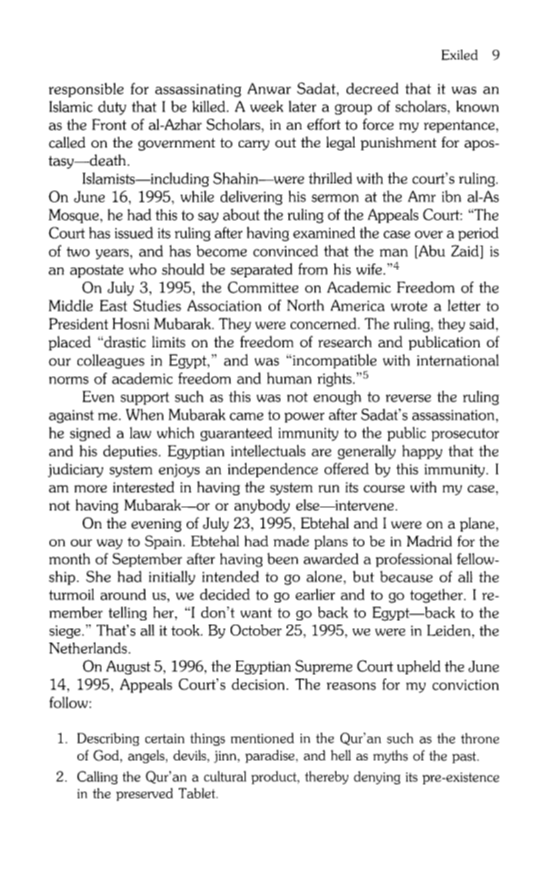Exiled 9 responsible for assassinating Anwar Sadat, decreed that it was an Islamic duty that I be killed. A week later a group of scholars, known as the Front of al-Azhar Scholars, in an effort to force my repentance, called on the government to carry out the legal punishment for apos- tasy—death. Islamists—including Shahin—were thrilled with the court's ruling. On June 16, 1995, while delivering his sermon at the Amr ibn al-As Mosque, he had this to say about the ruling of the Appeals Court: "The Court has issued its ruling after having examined the case over a period of two years, and has become convinced that the man [Abu Zaid] is an apostate who should be separated from his wife."4 On July 3, 1995, the Committee on Academic Freedom of the Middle East Studies Association of North America wrote a letter to President Hosni Mubarak. They were concerned. The ruling, they said, placed "drastic limits on the freedom of research and publication of our colleagues in Egypt," and was "incompatible with international norms of academic freedom and human rights."5 Even support such as this was not enough to reverse the ruling against me. When Mubarak came to power after Sadat's assassination, he signed a law which guaranteed immunity to the public prosecutor and his deputies. Egyptian intellectuals are generally happy that the judiciary system enjoys an independence offered by this immunity. I am more interested in having the system run its course with my case, not having Mubarak—or or anybody else—intervene. On the evening of July 23, 1995, Ebtehal and I were on a plane, on our way to Spain. Ebtehal had made plans to be in Madrid for the month of September after having been awarded a professional fellow- ship. She had initially intended to go alone, but because of all the turmoil around us, we decided to go earlier and to go together. I re- member telling her, "I don't want to go back to Egypt—back to the siege." That's all it took. By October 25, 1995, we were in Leiden, the Netherlands. On August 5, 1996, the Egyptian Supreme Court upheld the June 14, 1995, Appeals Court's decision. The reasons for my conviction follow: 1. Describing certain things mentioned in the Qur'an such as the throne of God, angels, devils, jinn, paradise, and hell as myths of the past. 2. Calling the Qur'an a cultural product, thereby denying its pre-existence in the preserved Tablet.
Document Details My Account Print multiple pages
Print
You have printed 0 times in the last 24 hours.
Your print count will reset on at .
You may print 0 more time(s) before then.
You may print a maximum of 0 pages at a time.









































































































































































































































